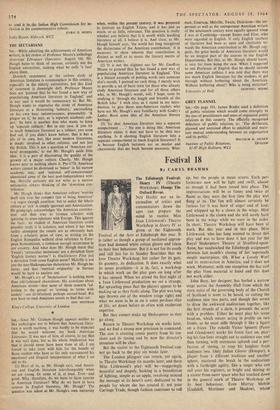Sia,---While admitting the achievements of American writers, in his review
of Professor Moore's anthology American Literature (Spectator, August 14), Mr. Hough hates to think of anyone, certainly not the English universities, making what he calls 'a fuss' about them.
Donnish resentment at the serious study of. American literature is commonplace in this country, especially in the elderly universities, but this kind of statement is downright daft. Professor Moore does not 'pretend that he has found a new way of popularising American literature in England,' and in any case it would be unnecessary to. But Mr. Hough wants to stigmatise the study of American literature as a threatening 'industry,' encroaching on his own busy industriousness, presumably. 'A plague on it,' he says, as 'a separate academic sub- ject: So here is another don who wants to keep up 'separate subjects.' But in any case, if you try to teach American literature as a subject, you soon find out, if you didn't know before, that it has a life of its own, but, like most modern literatures, is deeply involved in other cultures, and not just the British. This is not a question of 'American cul- tural propaganda,' to use Mr. Hough's snide little idea; it is a part of discovering the quality of the growth of a major culture. Clearly, Mr. Hough knows next to nothing about it. Pre-1776 American writers cannot be dismissed as 'minor' in his narrow academic way, and 'national self-consciousness' stimulated some of the best post-Independence writ- ing. Melville certainly did not write as a narrow nationalist, always thinking of the 'American con- tribution.'
Mr. Hough thinks that American culture 'worries itself sick over the complex fate of being American' —a vague enough assertion; but to indict the whole culture as 'sick' is simply ignorant anti-Americanism. He grudgingly acknowledges 'the American contribu- tion' and then tries to trounce scholars with ignoring its cross-relations with Europe. This ignores the facts: no student of American literature could possibly study it in isolation, and where it has been rashly attempted the results are as obviously bad, from a scholarly point of view, as writing on the English Romantics without close reference to Euro- pean Romanticism, a common enough occurrence in our country. And what does Mr. Hough mean that Twain's 'vernacular inventions' are a deviation from 'English literary norms'? Is Huckleberry Finn just a deviation from some English norm? Melville is not just the neo-Shakespearian rhetorician Mr. Hough be- lieves, and that 'metrical originality' in Stevens would be hard to analyse out.
Mr. Hough's cry of 'Sectarianism' is nothing more than old-fashioned chauvinism. His assertions about American novels—that none of them concern 'ad- justing to the group' or 'coming to terms with society'--are ill-informed, perhaps second-hand. But you have to read American novels to find that out.
King's College, University of London
ERIC MOTTRAM


































 Previous page
Previous page